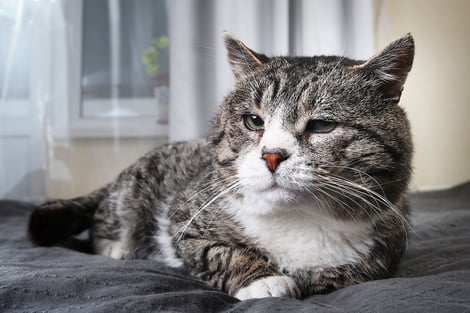9 Essential Tips for Enriching the Lives of Senior Cats

Senior cats can live long, healthy lives if we learn how to take care of their changing needs.
Cats can live 20 years or more, though if you check out the labels on cat food, they will indicate that senior cats are 7 years or older. The Association of Feline Practitioners considers seniors when they’re 10 years of age or older.
Regardless, your cat is unique and needs to be treated as such.
Cats can’t always communicate their pain and discomfort to their people, so it's up to pet parents to work with their vet to discover potential issues.
Nine tips to care for your senior cat
You've probably heard that cats have nine lives. While this isn't true, we have nine tips to care for your aging cat.
1. Schedule Regular Vet Visits
Your veterinarian is your most important resource when it comes to caring for a senior cat.
Regular checkups are a must for elderly cats. If you have a good relationship with your vet while the cat is young, your vet will be able to identify changes that occur as your cat ages.
Many cats don’t enjoy the travel to and from your vet’s office, but don’t let that stop you from scheduling regular visits. Take your time when preparing your cat to travel to the clinic and make your cat’s carrier a part of the home environment instead of stowing it far away and only bringing it out for vet visits. One idea is to take your cat on “test drives” for them to get used to car travel.
2. Note Changes in Behavior and Health
Even cats who appear to be healthy might be experiencing health issues. Is your cat hiding more than usual? Are they peeing or pooping where they shouldn’t be? Have their sleep patterns changed? Your vet will want to know about these changes to see if they are connected to a potential health problem.
3. Keep an Eye on Unexpected Weight Gain or Weight Loss
Changes in weight—in either direction—can indicate potential issues. Cats that are at an ideal body weight live longer and have less risk of diabetes, high blood pressure, heart and respiratory disease, cancer, and osteoarthritis.
There is a real danger in overfeeding senior cats. An estimated 60% of cats in the US are overweight or obese. You should be able to feel their ribs, and when you look at them from above, they should have an hourglass shape, not a loaf. If you have a long-haired cat like my cat, Pearl, you should be able to feel the rib bones just behind their front legs.
Being underweight can also indicate a problem with your senior cat. Hyperthyroidism, intestinal disease, and diabetes can cause weight loss. The only way to know is for your vet to examine your cat and run a few tests, such as bloodwork and checking a urine sample.
4. Watch for Signs of Pain
Remember, your cat won’t always know how to signal to you when they’re uncomfortable. That’s why we have to watch for changes in behavior, weight, and sleeping. When in doubt, talk to your vet.
One cool (and free) app is called the Feline Grimace Scale®, developed by experts. Anyone can use it to help them figure out if a cat is experiencing pain or distress. I learned a lot by using it when I noticed that Pearl wasn’t looking or acting herself, but she didn’t look or act so badly that it was obvious.
Just like us, cats can experience arthritis, or degenerative joint disease (DJD for short). If your senior cat doesn’t move around like they used to, talk to your vet about medications or home modifications to make them more comfortable.
5. Monitor the Litter Box
I know, yuck. But your cat’s litter box habits can tell us a lot about their health.
Cats are naturally clean, so if they are having accidents in the house, it could indicate a problem. If their poop changes color or their pee has blood in it (you may not notice this in the litter pan), you’ll want to get it checked out. Also, if you notice a lot more pee (or a lot less) in the litter box, that’s something to mention to your vet, too.
6. Modify Your Environment for Senior Kitties
You are basically creating a nursing home for your cat, so think about how to make their later years cozy and comfortable for their changing needs.
Make sure that the everyday items they need are accessible. Food and water dishes should be placed higher. Consider adding ramps or steps to their favorite sleeping spots if they aren’t able to jump up like when they were young. Also, make sure they can easily step in and out of their litter pan.
Give them extra padding for resting in their favorite spots, like windows letting the sunshine indoors and cat TV (that is, they can watch local wildlife and that's loads of fun for cats).
7. Keep Grooming
Daily brushing will help keep your senior cat’s coat healthy. The added bonus is that regular grooming helps you notice any new lumps, bumps, or wounds.
Nail trims are important, too. Older cats with arthritis may experience a problem with their nails growing into their paw pads (ouch!). Most people can do this at home. Find our helpful tips here.
8. Give Them Access to Healthy Food and Water
One of the best things you can do for your aging cat is to feed them a healthy, nutritious diet.
You don’t have to buy the most expensive food on the shelf. Commercial pet food companies that work with veterinary nutritionists make high-quality pet food. Whether you choose to feed your cat wet or dry cat food—or a combination—is something you can work out with your vet.
9. Plan for the Inevitable
Our senior cats can live long, healthy lives. But they won’t live forever; nobody does. Most pet parents feel better if they have a plan in place for what they will do when their cat reaches the end of their life. Whether your cat dies from natural causes or by euthanasia (humane death), there are ways to keep them comfortable and pain-free in their final months, weeks, days, and hours.
Cats Are Family
There are so many wonderful things about living with a cat and caring for a senior cat can be especially rewarding. Some cats who have been shy their whole lives will get all snuggly and cozy as they age.
I’m hoping my cat Pearl will eventually become a true lap cat, but at 13 years old, I’m still waiting. Until then, I have to keep something firm on my lap for her to willingly stay to get her dose of love.
You can still enjoy playing, petting, feeding, and grooming your cat as they age — and you’ll both enjoy the golden years.

